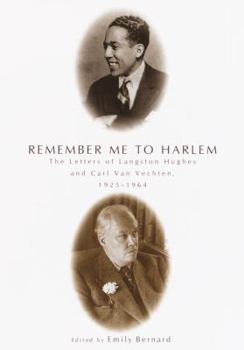Remember Me to Harlem: The Letters of Langston Hughes and Carl Van Vechten, 1925-1964
Select Format
Select Condition 
Book Overview
Langston Hughes is widely remembered as a celebrated star of the Harlem Renaissance -- a writer whose bluesy, lyrical poems and novels still have broad appeal. What's less well known about Hughes is... This description may be from another edition of this product.
Format:Hardcover
Language:English
ISBN:0679451137
ISBN13:9780679451136
Release Date:February 2001
Publisher:Alfred A. Knopf
Length:400 Pages
Weight:1.60 lbs.
Dimensions:1.3" x 6.7" x 9.6"
Customer Reviews
3 ratings
Harlem Renaissance Icons!
Published by Thriftbooks.com User , 19 years ago
Emily Bernard's REMEMBER ME TO HARLEM has to main goals. One, Bernard attempts with success to show the cordial communication between two leading figures of the Harlem Renaissance inner circle, Langston Hughes and Carl Van Vechten. Two, Bernard hopes to reveal a friendship uncommon for the day and time it flourished, the friendship between a black man and a white man during a major period of segregation and inequality between the black and white Americans. Of course, all this is done through the letters of Hughes and Van Vechten. Bernard does an excellent job at showing the relationship between these two icons of the Harlem Renaissance. Initially, their friendship starts off as sort of a patron, Vechten, helping to support a struggling artist, Hughes. As revealed in these compiled letters, this working relationship evolves into a friendship where Hughes often defends Vechten agianst distractors who view him as an exploiter and currupter of certain members of the Reaissance literatti (e.g. Hughes himself). Through Hughes, Vechten is shown morphing from an attitude of ignorance and paternal racist assumptions about the primitivism of blacks to one of "some" understanding but definite admiration for the black community. The two men were friends, but it must be stressed they were not best friends. Hughes best friend/almost brother was Arna Bontemps. I stress this difference because the tone of the letters differ when Hughes is writing to Vechten and Bontemps. Therefore, I STRONGLY RECOMMEND the purchasing of the letters between Langston Hughes and Arna Bontemps edited by Charles H. Nichols were Hughes is much less reserved than he is in his letters to Van Vechten on certain matters intimate to two men dealing with trials, tribulations, and triumphs of being black during the early and mid 20th century. A characteristic of the letters is the sign off. Vechten had a habit of grandiose and flowery sign offs in his letters to Hughes. He chastised Hughes for his cordial but distant ending of his letters with "Sincerely." In letters to Van Vechten only, Hughes eventually adopted the grandiose sign off in his letters but with a difference. Hughes was a socially consicious man and early civil rights activist and this is reflected in some of the ways he ended his letters to Vechten where the two men initially engaged in gossip about friends like Bessie Smith, DuBois, Ethel Waters, Countee Cullen, Richard Bruce Nugent, and so on and the goings on in their lives to the mundane aspects of business. Sadly, after Vechten writes to Hughes that he compiling Renaissance works for the beginning of the James Weldon Johnson Collection at Yale, the letters between the two men, Hughes especially conscious of posterity, become almost tedious. The wealth of the Bernard's compilation of the letters is in the notes following each letter where she provides bits of information about a person mentioned in the letter or current event of that day. This is wer
Wonderful & Insightful
Published by Thriftbooks.com User , 22 years ago
What a great book. It is amazing how much correspondence reveals about people. This book was so interesting. It truly covers decades of Black artisitic history.
The letters of Langston Hughes and Carl Van Vechten
Published by Thriftbooks.com User , 23 years ago
Bernard gathers and edits the letters of Langston Hughes and Carl Van Vechten, written between 1925-64, presenting a notable work of Hughes' mentor and the friendship which evolved between the two men. From discussions of literature and the publishing world to politics and gossip, these letters hold important keys to the personalities and concerns of two great men of the Harlem Renaissance.





